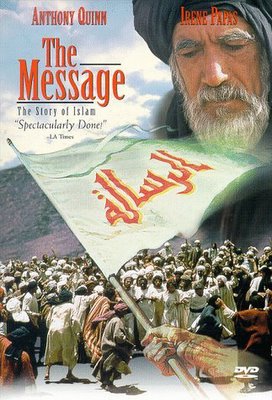- Mohammad, Messenger of God (retitled The Message for U.S. release) (1976) is a film directed by Mustafa Akkad, chronicling the life and times of the founder of Islam, Muhammad. Released in both Arabic and English, Mohammad, Messenger of God serves as an introduction to early Islamic history. Although the movie revolves around Muhammad, his image is not depicted in any way throughout the movie, out of respect for Muslim beliefs. Instead actors were left to talk to the camera.

- Akkad faced resistance from Hollywood to making a film about the origins of Islam and had to go outside the United States to raise the production money for the film. While creating Mohammad, Messenger of God, he consulted Islamic clerics and tried to be respectful toward Islam and its views on portraying Mohammed.
Nevertheless, some cinemas still received threatening telephone calls from those who thought that the film offended Islam by portraying the Prophet in a physical way, even though Mohammed is not shown on screen. On March 9, 1977, a group of Black Muslims, led by Hamas Abdul Khaalis, seized several buildings and took 134 hostages in the District of Columbia. While their actions were related to a sectarian dispute within the Black Muslim community, one of their demands was to prevent the release of Mohammad. One of the terrorists specifically said "he wanted a guarantee from whole world it will never be shown" or they would execute some of the hostages.
Aside from that, it's no wonder that you don't see any movies about Muhammed. Not only can you not see him or observe him to speak, but someone will probably try to kill you for it, even if your intentions are the best. Christianity, by comparison, has had an in-your-face sales pitch that is tough to even hide from. Jesus on film, Jesus on TV, Jesus appearing in a taco in Mexico. You can be sure that if Muhammed appeared in a taco, someone would have Supreme Indigestion. Yet, how would we know what he even looked like, since no one can be allowed to show a representation of him?
And note that the Muslim law isn't against portraying the image of Muhammed, but that of any prophet, like say Jesus or Moses. I guess they just don't feel that their proprietary and copywright trademarks are infringed in those cases.
Unfortunately for Islam, this adherence to their ancient law isn't going to win any hearts and minds in the internet or video age. Most people know the story of Jesus from happening to catch some late-afternoon showing of The Greatest Story Ever Told or King of Kings or Passion of Christ rather than actually reading a Bible or listening in church. By denying the use of Muhammed's image (oh, and threatening to kill cartoonists, of course), Muslims are making it just that much harder for people in the Western culture to even understand the religion, much less identify with it.
But I digress, and a lot. The hostage situation in DC had one lasting, somewhat ironic ramification. The hostage actions also had the unexpected result of catapulting then-DC-councilman and soon-to-be-most-notorious-mayor-alive Marion Barry to fame by shooting him in the chest during the crisis. The very next year he was elected mayor. One can only speculate if everyone's favorite crack addict would have become mayor if not for the notoriety of being shot by ignorant terrorists. Shows what a little press can do for you.
No comments:
Post a Comment